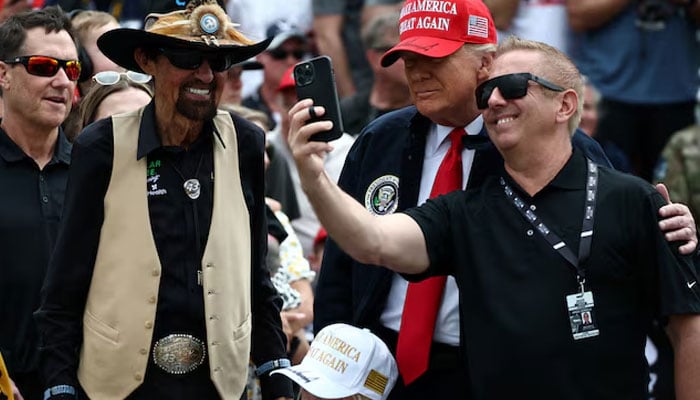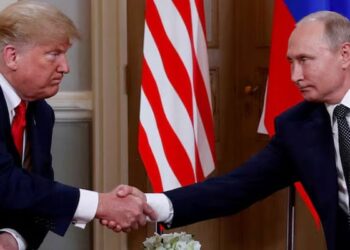President Trump Takes a Selfie at Daytona 500
Image Credit: Reuters
[Image of President Donald Trump taking a selfie with former NASCAR driver Greg Biffle and NASCAR Hall of Famer Richard Petty prior to the Daytona 500 at Daytona International Speedway in Daytona Beach, Florida, February 16, 2025.]
Trump Administration Eases Tariffs on Electronics
WASHINGTON/WEST PALM BEACH – The administration of President Donald Trump has recently lifted reciprocal tariffs on smartphones, computers, and various other electronic devices primarily imported from China. This decision provides significant relief for technology companies like Apple that depend on international supply chains.
The U.S. Customs and Border Protection agency released a notice listing the tariff codes exempt from import duties. These exclusions take effect retroactively from 12:01 AM EDT on April 5.
Among the 20 product categories listed by the CBP is the general code 8471, covering all computers, laptops, disc drives, as well as automatic data processing equipment. The exemption also includes semiconductor devices, memory chips, and flat panel displays.
Although the announcement does not specify the rationale behind it, the late-night exception is a welcome relief for major tech players such as Apple and Dell Technologies.
Additionally, Trump’s policy exempts the specified electronics from the 10% "baseline" tariffs imposed on goods from most countries outside of China, thereby lowering import costs for semiconductors sourced from Taiwan and Apple iPhones made in India.
Dan Ives, an analyst at Wedbush Securities, described the announcement as “the most optimistic news we could have received this weekend.”
Ives noted, “There is still significant uncertainty and volatility surrounding negotiations with China. Major companies like Apple, Nvidia, and Microsoft within the tech sector can breathe a major sigh of relief going into the new week."
Many technology executives have rallied around Trump as he begins his second term, attending his inauguration on January 20 and celebrating alongside him. Apple’s CEO Tim Cook has even hosted a functions prior to the inauguration and visited Trump at his residence in Florida.
It should be noted that the exclusions for Chinese imports only pertain to Trump’s reciprocal tariffs, which escalated to 125% this week, according to a White House representative. His previous duties of 20% on all Chinese imports—linked to the U.S. fentanyl crisis—remain in effect.
Furthermore, the official stated that Trump is expected to initiate a new national security trade investigation focused on semiconductors, potentially leading to further tariffs.
White House spokesperson Karoline Leavitt emphasized that Trump has stressed the importance of reducing dependence on China for critical technology manufacturing, such as semiconductors and smartphones.
She added that under Trump’s leadership, major tech firms—including Apple, Nvidia, and Taiwan Semiconductor—are racing to shift their manufacturing back to the United States as swiftly as possible.
Impact of Tariffs on the Market
The recent exemptions indicate a growing awareness within the Trump administration of the negative effects his tariffs could have on consumers grappling with inflation.
Even with a reduced tariff rate of 54% on Chinese imports, analysts predict that the price of a high-end Apple iPhone could soar to $2,300 from $1,599. At a rate of 125%, economists warn that trade between the U.S. and China could come to a near halt.
According to data from the U.S. Census Bureau, smartphones represented the largest U.S. import from China in 2024, averaging $41.7 billion, closely followed by laptops at $33.1 billion.
Recently, Apple arranged for cargo flights to ship approximately 600 tons of iPhones—up to 1.5 million units—from India to the U.S. in an effort to sidestep Trump’s tariffs.
Trump’s bid to reclaim the presidency last year prominently featured a commitment to reduce consumer prices, which have soared due to inflation, thus tarnishing the economic legacy of former President Joe Biden and his Democratic allies.
Nonetheless, Trump continues to pledge to enforce tariffs that are central to his economic agenda, viewing the resulting financial market disturbances and escalating prices as a necessary adjustment to rebalance global trade.
His reciprocal tariffs have raised recession concerns and met with dissent within his own party, as some fear losing congressional control in the upcoming midterm elections. Democrats have also been outspoken in their criticism of Trump’s methods.
In a recent move, Trump postponed increased tariff rates for 57 trade partners along with the European Union, maintaining most nations at a 10% rate while negotiations with Washington remain ongoing.
Spending the weekend at his residence in Florida, Trump told reporters he is comfortable with the elevated tariffs on China but maintains a positive relationship with President Xi Jinping, expressing hope for a beneficial outcome from the ongoing trade tensions.
Financial markets experienced turbulence again on Friday following China’s matching of Trump’s recent tariff increase on U.S. goods, raising their duties to 125%. This escalation threatens to disrupt global supply chains.
While U.S. stocks concluded a tumultuous week on a high note, gold prices surged to a record level. Benchmark U.S. 10-year government bond yields saw their most significant weekly increase since 2001, while the dollar fell sharply—indicative of decreasing investor confidence.





